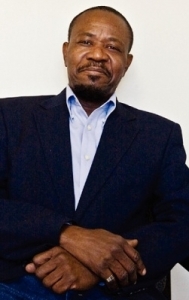MOC professor waits, watches devastation in his home country
By Catharin Shepard
Published in News on January 19, 2010 1:46 PM

Troy Herring
Dr. Asselin Charles, an associate professor of language and literature at Mount Olive College, is a native of Haiti.
MOUNT OLIVE -- A thousand miles away from his childhood home in Haiti, Mount Olive College foreign language professor Dr. Asselin Charles is watching the news streaming from his country with a sense of shock and powerlessness.
Shock that so many people, including several of his own close friends, died in the devastating earthquake that hit Haiti last week, and powerless to help those still fighting for their lives in the stricken Caribbean nation.
But unlike many other Haitian natives around the world who have had no contact with their families, Charles also knows a sense of relief. He was able to confirm that his family members still in Haiti survived the earthquake.
"They're doing fine, my half sister, niece, uncle," he said.
Charles was born and raised in the northern part of Haiti, where some of his family still lives. The country is a place he describes as financially impoverished, but extremely wealthy in other ways.
"As the cliché goes, (it is) one of the poorest countries in the hemisphere. It's impoverished but not poor. ... Culturally, it's one of the richest countries in the Americas," Charles said.
The professor left Haiti and moved to the United States when he was 19, and has since lived in the Canada and other places around the world before coming to teach at Mount Olive College.
The Canadian citizen found out about the earthquake through the news coverage of the event, he said.
"Immediately, all Haitians were connected. I got calls from Europe, from the Caribbean, from the Americas. We keep talking and talking and talking, finding out about our family and friends and regretting our powerlessness," Charles said.
An estimated two million people have been displaced, and more than 100,000 people are feared to have been killed. Rescuers continued this week to pull people from the shattered remains of buildings long after the 72-hour golden period had passed.
Charles' family last had contact with his half-sister four days ago, but have not spoken with her since then. They believe she is among the many people now trying to leave the capitol to return to homes that may or may not still be standing, traveling along roads that are equally uncertain.
"Better to be back home than be a refugee in the capital," Charles said.
Getting aid to those in need in Haiti has proven difficult, as rescue agencies contend with the country's limited airport space and severely damaged facilities. Losing the government buildings in the capitol city of Port-au-Prince has also proven challenging for outside aid and assistance workers who are attempting to organize relief efforts, Charles said.
"I think one of the major problems at the moment, the Haitian government has virtually collapsed. All of the symbolic landmarks of the Haitian government, all the ministries, the national palace itself, the cathedral that has been around since colonial times, all those buildings have collapsed, ministers have perished. The president himself is holding meetings in a police station. The international community really doesn't have any counterpart to deal with," he said.
But the funding, supplies and manpower being shipped to the island nation from the United States and countries around the world are beginning to reach the people in need of help, and Charles expressed his own thanks at the outpouring of support.
"We are really grateful and touched by the show of compassion which the entire world, first and foremost, have been showing Haiti. We really appreciate it. The international aid is beginning to have some impact. ... I think we're going to be needing that help for quite a while, because the city (of Port-au-Prince) is entirely destroyed.
"I would like to encourage Americans to continue to help with the situation in any way they can, any support and continued support is appreciated. We've been neighbors geographically, historically, and that's what neighbors do," Charles said.
And after the wounded are cared for, the dead buried and the homeless housed, the rebuilding process will take not months or even years, but entire generations, he said. While homes and public buildings can be reconstructed, they are not the only structures that must be rebuilt for the country to truly recover from the disaster, Charles believes.
"Many of the problems in the aftermath have to do with functioning of government, and we have to rethink that, rebuild Haitian society on new foundations, more egalitarian, more progressive, and rethink our ties with one another as well as our ties with the international community, so it's also an opportunity," he said.
The people of Haiti are no strangers to turmoil. The nation, once a French slave colony, won its independence in 1804 after 12 years of revolutionary war. Haiti was the second country in the Western hemisphere to become an independent republic, after the United States. The country is on the western half of the island of Hispaniola, while the Dominican Republic makes up the eastern half.
"We've seen a lot, and we intend to be around for another 300-400 years," Charles said.
Despite the horror of the situation, there could be a silver lining, he said.
"Collective trauma and crisis, as the Chinese proverb says, are also opportunities. I think this might be an opportunity for a fresh start for Haitian society," he said.
